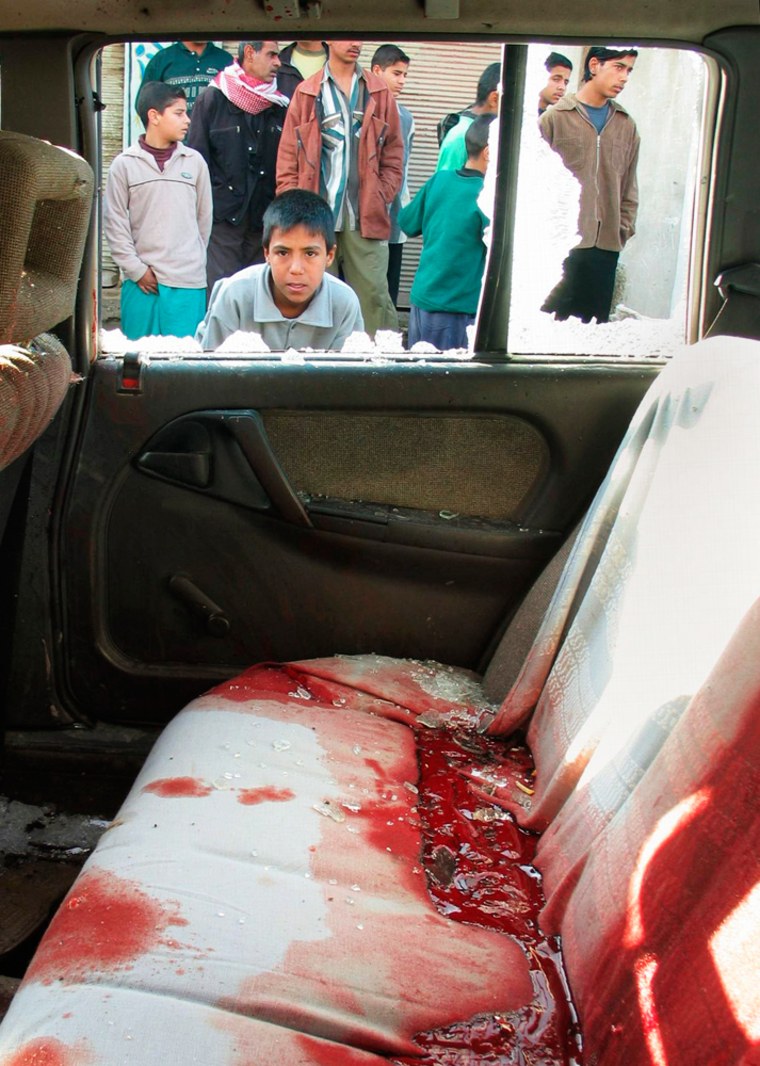Insurgents struck with a vengeance in a burst of attacks following a post-election lull, killing at least 29 people, including two Marines. In one ambush, they waylaid a minibus carrying new Iraqi army recruits. Elsewhere they detonated car bombs and gunned down police and Iraqis working for the U.S. military, officials said Thursday.
Insurgents had eased up on attacks following Sunday’s elections, when American and Iraqi forces imposed sweeping security measures to protect the voters.
U.S. soldier attached to a Marine unit was killed while carrying out operations south of Baghdad, the U.S. military said on Friday.
The soldier was killed in Babil province, which stretches just south of the capital, on Thursday, but no further details were given
Separately, U.S. and Iraqi security forces may have come close to capturing Iraq's most-wanted militant leader Abu Musab al-Zarqawi in the past two weeks and are weakening his network, Iraq’s interior minister said Thursday.
'Missed him by one hour'
“We are following him,” Interior Minister Falah al-Naquib told Pentagon reporters in a videoconference from Baghdad. “I think we missed him twice or three times, but hopefully next time we will be able to capture him.
“I think we arrived a bit late. Maybe we missed him by one hour. ... You know, he is not staying in one place. He is moving from one area to another. So, we will get him — very soon, hopefully,” Naquib added.
Rumors of Zarqawi’s capture have surfaced in recent weeks, including reports a month ago that he had been apprehended in the insurgent stronghold of Baqouba, north of Baghdad.
The minister declined to provide details of the latest raids, including where they occurred and whether they involved joint U.S.-Iraqi operations. But he said Zarqawi’s support network had been weakened with the arrests of more than 350 “terrorists” in the three weeks before Sunday’s election.
Zarqawi is a Jordanian Sunni Muslim who leads a group in Iraq that allies itself with the al-Qaida network. The group has claimed responsibility for numerous car bombings and other deadly attacks on U.S.-led forces in Iraq and on Iraqi police and other security forces.
Insurgents ambush minibus
In the deadliest incident, insurgents stopped the minibus south of Kirkuk, ordered army recruits off the vehicle and gunned down 12 of them, said Maj. Gen. Anwar Mohammed Amin. The rebels allowed two of the soldiers to go free and ordered them to warn others against joining Iraq’s U.S.-backed security forces, he said.
The assailants identified themselves as members of Takfir wa Hijra, an Islamic group that emerged in the 1960s in Egypt, rejecting society as corrupt and seeking to establish a utopian Islamic community.
In other violence:
- Gunmen fired on a vehicle carrying Iraqi contractors Thursday to jobs at a U.S. military base in Baqouba north of the capital, killing two people, officials said.
- Two civilians were killed and six injured Wednesday night when insurgents fired mortar shells at a U.S. base in Tal Afar, 30 miles west of Mosul.
- A suicide car bomber struck a foreign convoy escorted by military Humvees on Baghdad’s airport road Thursday, destroying several vehicles and damaging a house, Iraqi police said. Helicopters were seen evacuating some casualties, witnesses said. There was no immediate comment from the U.S. military.
- Insurgents ambushed another convoy on the Baghdad airport road, killing five Iraqi policemen and an Iraqi National Guard major, police said.
- An Iraqi soldier was killed Thursday by gunmen as he was leaving his Baghdad home, officials said.
- Also, the bodies of two slain men wearing blood-soaked clothes were found in the western insurgent stronghold of Ramadi. A handwritten note tucked into the shirt of one of the men claimed the two were Iraqi National Guardsmen.
- A car bomb exploded at a house used by U.S. military snipers in Qaim, near the Syrian border, witnesses said. Other U.S. troops responding to the scene opened fire, hitting some civilians, the witnesses said. A U.S. military spokesman had no immediate information.
- In the south, gunmen overran a police station in the city of Samawah, killing one Iraqi policeman and injuring two others Wednesday night, Japan’s Kyodo news agency reported. Japanese troops are based outside Samawah.
- The governor of Anbar province, a rebel stronghold west of the capital, escaped assassination Thursday when a roadside bomb exploded near his car in Ramadi.
- Both Marines were killed in clashes Wednesday in Anbar province, which includes such restive cities and towns as Ramadi, Fallujah and Qaim.
Allawi: Insurgents will fail
The surge in violence occurred shortly after interim Prime Minister Ayad Allawi declared that the success of Iraq’s elections had dealt a major blow to the insurgency and predicted victory over the rebels within months.
Allawi cited a drop in violence immediately after Sunday’s balloting, although he said it was too early to tell if it was a trend.
“They might be reorganizing themselves and changing their plans,” Allawi told Iraqi television. “The coming days and weeks will show whether this trend will continue ... But the final outcome will be failure. They will continue for months but this (insurgency) will end.”
Iraqis turned out in large numbers to vote for a 275-seat National Assembly, provincial councils and a regional parliament for the autonomous Kurdish north. But in large areas of the country where the Sunni Arab-led insurgency still roils, few went to the polls, either because of objections to the holding elections under foreign occupation or for fear of retribution.
Because many Sunnis stayed away from the polls, influential Sunni clerics — including many who had called for a boycott — are now challenging the legitimacy of the balloting and the government that will emerge from it.
